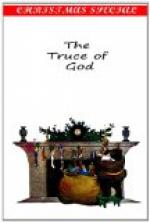The old woman slunk terrified into a corner, but Margaret hastily replied:
“You are already informed, sir, of the violation of the truce of God, which occurred this morning. Our magic consisted only in the discovery that there was no poison upon the knife which inflicted the wound.”
“I cannot but think,” rejoined her father, “that you have displayed an unnecessary interest about the result. That young stripling has cost me more lives than he numbers years; and though I could not connive at Bertha’s attempt to assassinate, I certainly do not see much reason to rejoice at his escape.”
It may have been that Margaret quailed a little beneath her father’s rigid scrutiny, but without embarrassment she returned:
“If I had been born and bred to arms, if my breast were accustomed to the coat of mail, if my hand could wield the battle-axe, I might anxiously crave, or coldly behold the murder of a foe confiding in our generosity and in our plighted faith to the Church; but I have never worn the gauntlet, or drawn the sword; my heart has never exulted at the gladsome sight of an enemy’s blood, and I scorn to ascribe the interest I may have shown, to a wish of having the sweet assurance that a scion of Hers would perish like a dog, when in reality I hoped to find the weapon venomless.”
“Spoken like a woman, as you are,” muttered the knight. “I would have you feel otherwise, but God has given you your sex; I cannot change its nature.”
The Baron of Stramen was a tall, powerful man, whose vigor fifty years had not impaired. His face was stern, though not repulsive, and free from any approach to vulgarity. A man of strong passions, yet the strongest of all was an unvarying love for his daughter, on whom seemed to have centered all the tenderness of which he was capable. On the present occasion, he put an end to further controversy by drawing Margaret to his side, and giving her an exquisitely wrought head of Gregory VII.
“Treasure it, my child,” he said, “it is the faithful likeness of a wonderful man—a man who may one day, with a few stout hearts to second his energy, chastise the impious tyranny of the house of Franconia!” He spoke with deep feeling, and, after pacing the room, with his arms folded upon his broad breast, abruptly stalked through the door, apparently absorbed in some momentous question.
No sooner had he gone, than Margaret turned to Linda, who still occupied the corner, and dismissed her with a message to Father Omehr. When alone, she knelt down before an ivory image of the Blessed Virgin and prayed—not to the polished ivory—but to the Mother of purity whose intercession it suggested, with a fervency and constancy which only they venture to ridicule who cannot record the virtues of Mary without a sneer.




